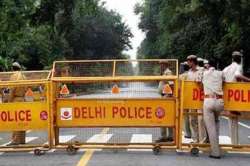Over 8 lakh litres liquor, 40K seized vehicles lying in police stations: Delhi Police to SC
The police also gave details of the works, along with the timeline, which are being carried out to remove traffic bottlenecks from congested corridors in Delhi which have been categorised under category 'A', 'B' and 'C'.

Over eight lakh litres of seized liquor and 40,233 impounded vehicles were lying in police stations across the national capital, the Delhi Police told the Supreme Court Wednesday.
In an affidavit filed before a bench of Justices Madan B Lokur and Deepak Gupta, the police said a policy has been formulated to de-congest police stations by removing or disposing of impounded materials lying there.
The police has said that a "policy has been formulated with the object to decongest police stations by way of removal/disposal of seized/impounded material/vehicles and to ensure that such materials do not create impediment in the smooth flow of traffic and do not become breeding grounds for disease carrying vectors."
It also said that the department has written to the Principal Secretary (Home) of the Delhi government to expedite the process of appointment of 'Nazirs' (record keeper of a malkhana) for each revenue district.
The affidavit, which explained the policy for disposal of case properties, said the storage capacity of 'Malkhanas' (where seized materials are kept) in police stations were "grossly insufficient".
"As on July 31, 2018, a total of 40,223 seized vehicles are lying in police stations.... Some vehicles also keep lying in police custody because their owners have already claimed insurance and the insurance companies are not interested to take the vehicle to save the expenses of lifting, storage and disposal of vehicles," the affidavit said.
It said that illicit liquor too occupies a lot of space in police stations.
"Illicit liquor lying in police stations is another item which occupies a lot of space. As on August 31, 2018, there was a total of 8,02,370 litres of seized liquor lying in police stations," the affidavit added.
It also mentioned the strategies to dispose of case properties lying in various police stations, including immediate release of case properties which can be returned to the rightful owner.
"Shifting of such case properties which cannot be released immediately to the centralised Malakhana within 15 days of seizure of the property... and expediting the final disposal of old case properties lying in police stations by way of return to rightful owner, auction destruction etc by obtaining court orders as per law," it said.
The police, in its policy to decongest police station, said the exercise to dispose of case materials was needed to be done on a "continuous basis" so that a "steady disposal" was achieved.
On disposal of seized contraband, the police said that as per the procedure followed, the samples are sent to forensic science laboratory for chemical analysis and after the receipt of chemical analysis report, application for disposal is made in the designated court of Narcotic Drugs and Psychotropic Substances (NDPS).
It also said that drugs having legitimate medical or industrial use can be sold as per advice of chief controller with Government Opium and Alkaloid Factories.
"In case the drug is not found fit for such use, the same must be destroyed with the help of incinerators fitted with appropriate air pollution control devices after seeking necessary permission from state pollution control board," it said.
"Appropriate agency is hired to carry our destruction by following due procedure," it added.
The police also gave details of the works, along with the timeline, which are being carried out to remove traffic bottlenecks from congested corridors in Delhi which have been categorised under category 'A', 'B' and 'C'.
The police, which had earlier given details of the work to be completed under category 'A', informed the bench about tasks identified under categories 'B' and 'C'.